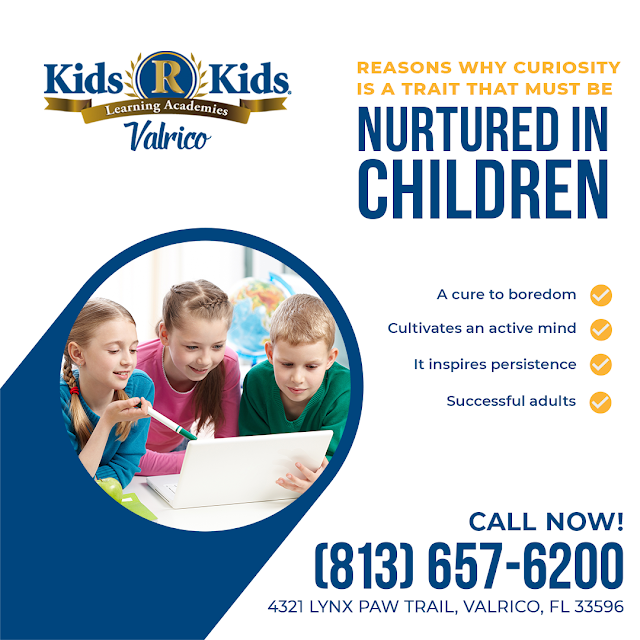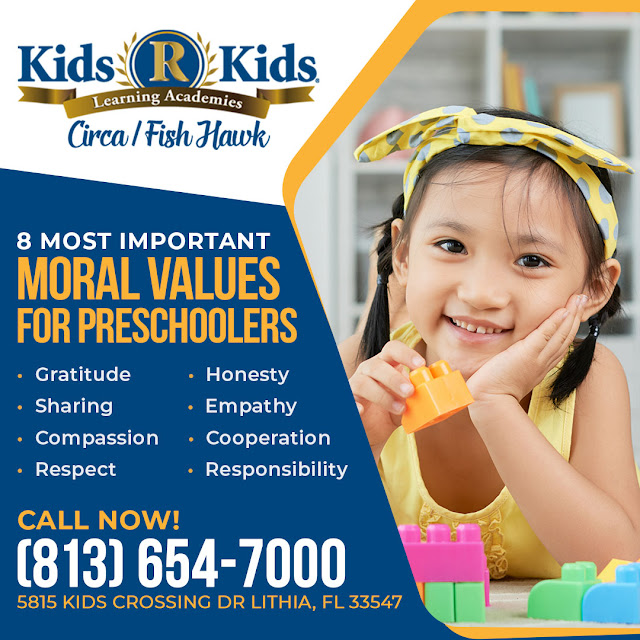Kids 'R' Kids Learning Academy of Valrico
Tuesday, June 21, 2022
Thursday, May 19, 2022
Monday, May 9, 2022
Kids 'R' Kids Shares How to Teach Children to Share
Tips to build the habit of sharing
Every successful relationship, personal or professional is built on the foundations of cooperation, collaboration, and teamwork. Sharing time, money, or resources makes the world a kinder and happier place. This is a quality that must be built in the young generation at the earliest. Kids ‘R’ Kids, an educational preschool in Valrico, shares some tips on imbibing this wonderful quality of sharing in children.
.png)
Developmental Readiness for Sharing
The ability to share is directly related to empathy. Children are developmentally able to share only when they are cognitively able to understand another person’s point of view. Young children are naturally very egocentric. They have difficulty seeing anything outside their point of view. Studies show that during the ages of approximately 2 – 7 years old, children are slowly learning to understand that others have different thoughts, perspectives, and ideas than their own. Sharing will be vehemently resisted by this age group as they are only just beginning to understand other people’s points of view.
Like any developmental milestone, there is an age when children can be expected to share. And just like any other skill, sharing takes practice, time, and positive reinforcement.
Tips for Teaching Sharing
-
Sharing is Not Just About Objects
Sharing transcends objects. It is not just about sharing a favorite toy but also about sharing time and resources. A child who waits his turn to play is sharing his time and patiently waiting for the other child to finish his turn. A child who is investing time and energy to console a friend is sharing.
By modeling, this behavior at every opportunity adults can encourage children to share.
-
Teach the Language of Sharing
The developmental milestone of sharing may not have been achieved yet but the language of sharing can be taught and reiterated at an early age. Toddlers can be explained how a younger child needs more attention at one point and that they must wait their turn to receive the desired attention. Helping children assign words to their feelings while waiting for their turns can help. Praising the children for their ability to share can also give them the confidence to repeat the action.
-
Play Cooperative Games
Games that require children to cooperate and wait for their turns are a great setting to learn to share in. For instance, taking turns while playing a board game or putting together a puzzle allows children to practice sharing with others.
-
Let Them Not Share Sometimes
Children don't need to share everything, every time. A favorite toy could become a bone of contention and is, therefore, best kept away during playdates, for instance. It’s important to set up children for success by not forcing them to share something special with them. Giving them the liberty to choose to share their favorite toys may help them be more willing to share later.
-
Set Expectations
A heads-up on a possible situation where they may have to share allows children to process the information and be prepared. A simple explanation of the situation can go a long way. For instance, informing the kids that a family is coming over with two kids for dinner, and they all can play with their toys together. Also giving them an option of keeping away their favorite toys sets up the children for success during the social interaction and gives them the freedom of choice.
-
Positive Reinforcement and Direction
Positive reinforcement lies at the foundation of all learning. Therefore, children must be praised when they gracefully share their toys with their peers. On the other hand, escalating the situation and trying to force a child to share does not have a positive effect in the long run. Suggesting an activity that requires all children to work together such as play-doh or coloring may diffuse the pressure of sharing and give them the comfort of choice and liberty. They may feel comfortable eventually sharing and must be showered with praise for their efforts.
.png)
Why Kids ‘R’ Kids?
The philosophy of “Hug First, Then Teach”, defines every aspect of what Kids ‘R’ Kids, Valrico stands for. Unlike many daycare centers or childcare providers, its methodology is a whole-child approach. It constantly strives to strengthen and encourage every child’s emotional, intellectual, social, and physical well-being through the expertise of its childcare providers and a unique partnership with parents.
Kids ‘R’ Kids International is accredited by AdvancED®, the world’s largest education community, and the Southern Association of Colleges and Schools Council on Accreditation and School Improvement (SACS/CASI). SACS/CASI is an accreditation division of AdvancED®. This accreditation ensures that the high accreditation standards are met and exceeded.
Kids 'R' Kids Shares 8 Tips to Help Preschoolers Succeed at School
How to set your child for success?
Early childhood is the time for setting a strong and balanced foundation for future success. Every parent and teacher aims to raise and educate their children to become well-rounded, confident, self-motivated, and independent adults. Kids ‘R’ Kids, an educational preschool in Circa Fishhawk, shares some important tips for parents to set up their children for success at school and in life.
.png)
-
Let them play
Play is the most underrated yet most impactful form of learning for young children. Children must engage in free play every day beside the structured play at school and home. Extracurricular activities are great for kids but their creativity and problem-solving skills are best developed during unstructured play.
-
Read every day
Reading to children opens up a whole new world to them. Reading not only enhances their language skills, imagination, and critical thinking skills, and also encourages parents-children bonding. Reading helps develop children’s emotional maturity and helps them assign words to emotions they feel. This is an activity that allows a dialogue and discussion between children and parents that encourages thinking and communication.
-
Instill independence
Independence is a life skill that must be taught to children early. Allowing a child to make mistakes and learn from them to make better decisions is a skill that will make a massive difference in their lives as adults. Parents can begin teaching this skill by allowing children to resolve their conflicts with friends among themselves, encouraging them to do some homework independently, packing their bags every day, and taking responsibility for some age-appropriate chores.
-
Build grit
The American Psychological Association states that grit is what separates the very best from those who are simply good enough. Angela Duckworth, a psychologist at the University of Pennsylvania, found in her research that a combination of grit and self-control, reliance, and ambition were the most reliable predictors of a positive outcome, rather than intelligence. The kids who won the spelling bee, for instance, weren’t necessarily smarter than their peers; they just worked much harder at studying the words.
Parents can offer challenges to children to work through and overcome. Adversity and even failure are critical to a child's development.
-
Build their individuality
All children have different strengths, weaknesses, interests, and passions. It is children’s emotional need to be accepted as individuals and be allowed to pursue their natural inclinations.
Giving children the opportunity and the encouragement to experience all extra-curricular activities at school such as drama, music, dance, and public speaking besides academics is crucial for their development. Children must be allowed to indulge in activities they feel naturally drawn to. These interests may convert into valuable career choices later on.
-
Disappointment is necessary
Distress, disappointment, frustration, relief, anticipation, anger, fear… these are emotions that are a part of everyone’s life. Protecting children from these experiences can weaken their ability to handle adversity later in life. Children must experience disappointment and acquire the skills to cope with this emotion. Not having these skills when parents are not around to help can prove to be a huge source of stress. So disappointment is good.
-
Understand developmental milestones
Children must cross certain developmental milestones before they are ready to acquire certain skills. Forcing certain skills such as reading, writing, and math skills before children are developmentally ready can lead to learning gaps later on. Pushing children to learn something they are not ready for not only disrupts their foundational skills but also takes away invaluable time they would have spent in free play and in exploring their curiosity.
-
Make them Accountable
Adults are accountable for their actions. And this ability to accept accountability must be taught at an early age. For instance, if children leave their toys all over the floor, they are expected to collect them. If they hit another child, there are consequences. This is a life skill required in professional as well as personal equations.
.png)
Why Kids ‘R’ Kids?
The philosophy of “Hug First, Then Teach”, defines every aspect of what Kids ‘R’ Kids, Circa Fishhawk stands for. Unlike many daycare centers or childcare providers, its methodology is a whole-child approach. It constantly strives to strengthen and encourage every child’s emotional, intellectual, social, and physical well-being through the expertise of its childcare providers and a unique partnership with parents.
Kids ‘R’ Kids International is accredited by AdvancED®, the world’s largest education community, and the Southern Association of Colleges and Schools Council on Accreditation and School Improvement (SACS/CASI). SACS/CASI is an accreditation division of AdvancED®. This accreditation ensures that the high accreditation standards are met and exceeded.
Call today at (813) 654-7000 to learn more about the Kids ‘R’ Kids before and after school programs (Kindergarten to Grade 5) or to schedule a visit.
Monday, March 7, 2022
Kids 'R' Kids Discusses the Cognitive Development of Preschoolers
Encouraging cognitive development in preschoolers
Early childhood is a very crucial time for the cognitive development of a child. Parents need to understand how a child’s brain develops and support this development. Kids ‘R’ Kids, an educational preschool, shares important facts about early cognitive development and tips to encourage this development in preschoolers.
Piaget’s Theory of Cognitive Development
Jean Piaget's theory of cognitive development suggests that intelligence changes as children grow. A child's cognitive development is not just about acquiring knowledge; the child has to develop or construct a mental world model.
Cognitive development occurs through the interaction of innate capacities and environmental events, and children pass through four stages. Each child goes through the stages in the same order, and child development is determined by biological maturation and interaction with the environment. The four stages are the sensorimotor stage (birth to 2 years), preoperational stage (2-7 years), concrete operational stage (7-12 years), and the formal active stage (12 years and above). Here’s more about the preoperational stage that is relevant for preschoolers.
The Preoperational Stage - Ages: 2 - 7 Years
Children in this stage are learning to use language and think about the world symbolically. These skills help children develop the foundations to use operations in the next step consistently. A child’s thinking is dominated by how the world looks, not how the world is. It is not yet capable of the logical (problem-solving) type of thought. Children at this stage also demonstrate animism. This is the tendency for the child to think that non-living objects (such as toys) have life and feel like a person’s.
How can parents promote cognitive development in preschoolers?
Play is a vital component of cognitive development in early childhood. It also allows parents to engage with their children. Parents can build an affectionate and loving relationship with their children to become the foundation for their development and learning.
Preschoolers learn best through child-led or even adult-guided play. Children require lots of unstructured play with others that teach them to share, cooperate, resolve conflict, negotiate, and make friends. Here are a few ways parents can help preschoolers build their cognitive skills.
1. Reading
Reading daily to children is a great way to help their cognitive development. It helps develop the following skills:
-
Vocabulary
-
Language patterns
-
Thinking skills
-
Writing skills
-
Problem-solving abilities
-
Attention span
-
Memory
-
Listening skills
2. Talking
Talking with children about their day at school, their experience with an activity, about their friends, during a bath or a walk allows children to use the language they are hearing. Parents are the primary source of vocabulary for children in the early years. Since children learn by imitation, parents must use grammatically correct language that stimulates a child’s mind.
3. Nursery Rhymes
Nursery rhymes are not only entertaining for children; they also teach language patterns and vocabulary and help build auditory perceptual skills. Classic nursery rhymes, songs, and poems are rich in language constructs that can help set up children for reading success later on.
4. Thinking Games
Critical thinking skills are crucial for a successful adult. Thinking “outside the box” and creative problem-solving can be built by playing various thinking games. Games such as the guessing game, the prediction game, pretend-play game, and memory games are all meant to develop different thinking skills in children.
5. Creative Activities
Creativity involves two processes - thinking and producing. Creative thinking helps the brains develop neural connections and learn new concepts. It fosters mental growth in children by providing opportunities to experiment with new ideas, new ways of thinking, and problem-solving. Activities such as drawing, painting, molding, creating something with waste materials, or pretend-play are forms of creative expression. Parents can provide opportunities, materials, and stimulation for children to develop creative skills.
6. Puzzles
Puzzles require a lot of concentration and effort, and perseverance to complete. Children who solve puzzles develop deep thinking and intellectual capabilities. Parents can present children with challenging yet doable puzzles appropriate for their age.
7. Movement
Movement helps build neural pathways in the brain. It helps in the development of gross and motor skills among children. Exercise wakes up, resets, and re-energizes the brain. Therefore, it can be used to reset a child’s concentration during any activity.
8. Symbolic Play
Symbolic play is when children use objects to represent other objects during make-believe play. A highly creative form of play, extended play enables children to develop advanced intellectual skills.
During this kind of play, children invent new ways to act out their world to make sense of it. Parents can offer access to toys and materials to encourage this play.
9. Age Appropriate Toys
A stimulating environment for a child does not require fancy toys or equipment. Basics such as wooden blocks, Lego, playdough, books, construction materials, and natural materials can be offered to children on alternative days or after every few days. Children are encouraged to invent novel ways to play and create by providing different manipulatives.
Why Kids ‘R’ Kids?
The philosophy of “Hug First, Then Teach” defines every aspect of what Kids ‘R’ Kids, Valrico stands for. Unlike many daycare centers or childcare providers, its methodology is a whole-child approach. It constantly strives to strengthen and encourage every child’s emotional, intellectual, social, and physical well-being through the expertise of its childcare providers and a unique partnership with parents.







